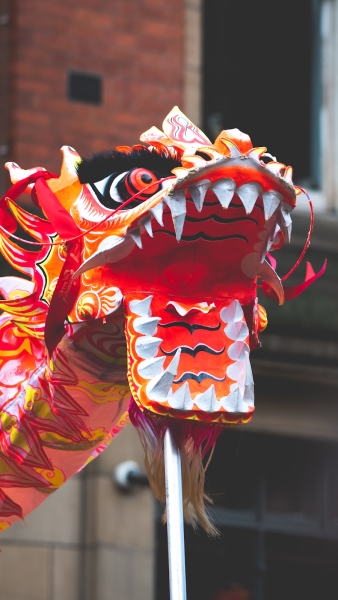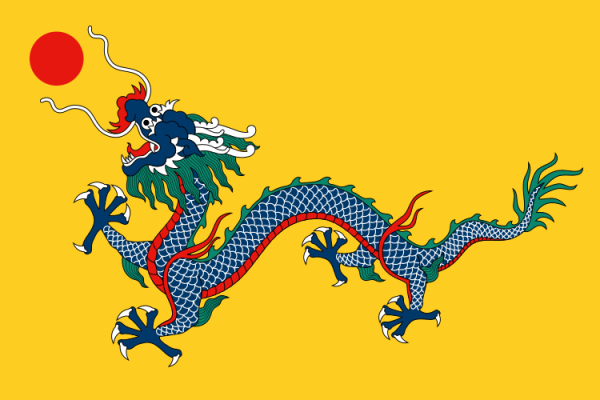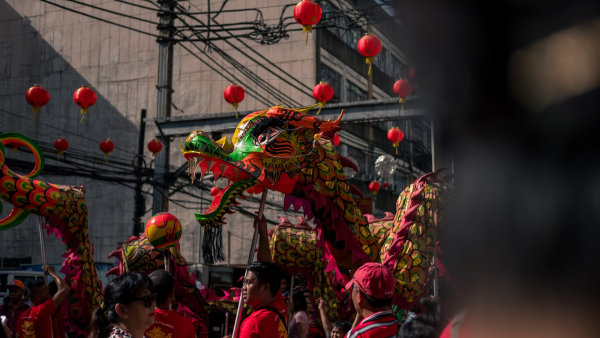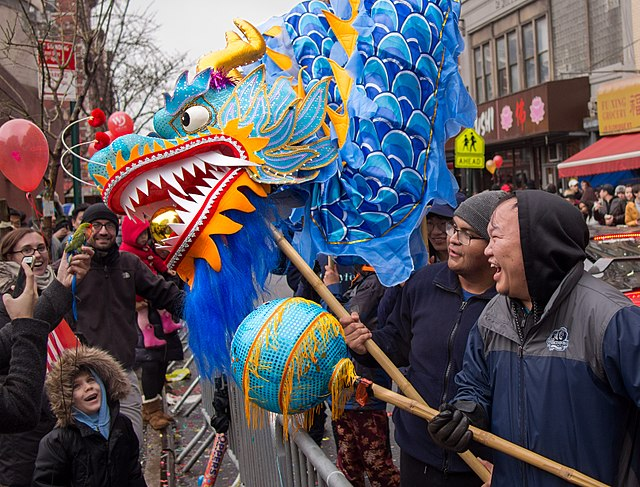For many, the end of December brings a little bit of gloom. Christmas, Hanukkah, Kwanzaa, and New Year’s Eve have all come and gone. School and work are back in full force, and winter has lost most of its charm without the holidays.
Yet for many others, the festivities have only just begun. Each year, usually from the end of January to mid-February, comes an exciting time for those who observe the Lunar New Year. Celebrated for thousands of years, stretching back to ancient times in countries throughout Asia, this holiday has now gone international, having spread around the world. Though customs may differ across cultures, this holiday is generally considered as a celebration of abundance and good luck. No matter where in the world, Lunar New Year is celebrated by gathering with one’s entire family; many travel hundreds of miles just to reunite with their loved ones for this special occasion.
A particularly key aspect of Chinese Lunar New Year customs is to celebrate the year’s corresponding animal in the Chinese zodiac calendar. According to classical Chinese legend, the Jade Emperor created the first calendar — a cycle system of twelve years — by commencing a race of all the animal species, the fastest of which would have a year of his calendar named after them; the first to reach the end of the race, the rat, was given the first year, and so on, until twelve places were filled.
This calendar dates back over 2,000 years, but still plays an equally enormous role in the identities of Chinese people today. Being born in a particular year and assigned a particular zodiac animal is seen as a determining factor of a person’s character traits, and may even be foretelling of their future success in work, school, and love.
2024 in particular rings in an especially festive Lunar New Year for it is once again the year of the dragon. But what is so remarkable about the year of the dragon? What sets it apart from the other eleven animals, and how does it bring alive the Lunar New Year?

The Luck of the Dragon
In the original legend of the zodiac calendar, the animals are individually characterized by their unique traits and abilities that affect their performance in the race; for instance, the rat is quick-witted and moves nimbly, while the innocent pig slowly lumbers along. As the only mythical creature of the zodiac, the dragon gracefully glides through both sea and sky, representing a life without obstacles. Given this story, confidence and creativity are said to come naturally to those born in dragon years. People born with the dragon zodiac sign are deemed determined and courageous. To be a dragon is to be a natural-born leader.
In fact, dragons – or at least their symbol – have ruled China for thousands of years.
The dragon’s role as an emblem of Chinese imperial power traces back to Xuanyuan Huangdi, the Yellow Emperor. A prominent figure in Chinese mythology, Huangdi is among China’s most recognizable cultural heroes; through varying accounts, he is credited for the invention of clothing, the first Chinese writing system, the concept of money, and more. Above all, Huangdi is regarded as the ancestor of all Han Chinese people. According to the legend, at the end of his illustrious life, he morphed into the Yellow Dragon before ascending towards heaven.

In awe of this powerful story, Han Chinese occasionally refer to themselves as “descendants of the dragon.” Moreover, China’s national flag from 1889 to 1912 was referred to as the Yellow Dragon Flag. The flag featured a bright yellow backdrop, drawing attention to the roaring dragon in its foreground.
The tale of the Yellow Emperor’s reincarnation set the stage for dragons to embody the strength of emperors for years to come. For instance, the traditional seat of the emperor is known as the “Dragon Throne,” though the term can also apply to the Chinese monarchy as a whole, similar to the British “Crown.”
Up until the last few centuries, wearing dragon embroidery and enjoying dragon-themed items was a privilege reserved solely for those related to the emperor. Any commoners who dared to display the dragon motif faced the threat of capital punishment. A prime example of this can be found in traditional dragon robes. These dragon-embellished robes were worn by rulers throughout numerous Chinese dynasties. However, they also disseminated over time to the royalty of neighboring countries such as Vietnam and Korea.
Though these traditions may now be outdated, the remarkable aspects of dragons has evolved into a fascination surrounding dragon years. And of course, babies born in the year of the dragon are brought into the world with the expectation of being modern-day emperors, the leaders of their disciplines.
The “Dragon Baby” Boom
Perhaps with these grandiose promises of success, it is not surprising that it is many parents’ dream to have their very own child born in a dragon year. When the lunar zodiac calendar cycles back to the dragon every twelve years, countries that observe it, such as China and Vietnam, report significant upticks in birth rates. This trend extends to other Asian countries with a sizable Chinese diaspora like Malaysia and Singapore. In prior dragon years, even American obstetricians and fertility centers have seen surges in Asian clients as families scramble to bestow good luck upon their future child.
Despite the Chinese zodiac tracing back thousands of years, this dragon year baby boom is a relatively new phenomenon. Researchers and demographers have found that birth rates have only started to rise since 1976.
Why then in particular? For one, from the late 1960s through the ’70s, China was undergoing the Cultural Revolution, spearheaded by leader Mao Zedong. Throughout this period, the Chinese Communist Party sought to rinse the country of traditional Chinese culture, and thereby eliminate any so-called remnants of capitalism. Celebrating the superstition surrounding the dragon may have been one form of defiance against this movement; the people clung to this symbol of ancient China as all other traditions were under attack. 1976 also saw the development and popularization of modern contraceptives and fertility tools, which would have facilitated an increased number of planned pregnancies, and thus, a baby boom.
Evidently, these original reasons for the initial dragon year baby boom may not be as relevant in the present day. But it is clear that these factors revived a superstitious spirit, one that continues to play an important role across the world today.
Are Dragon Babies Really More Lucky?
Throughout this entire discussion, however, the one blaring question remains: are babies born in the year of the dragon really more lucky?
As with any label so subjective, it’s hard to say.
As reported by a 2017 research paper from the National Bureau of Economic Research, students born in a dragon year are more likely to have a college education. They also perform better on the entrance exam to university and receive higher test scores in middle school. But is the dragon’s luck really behind this?
Not exactly. Parents intent on having a dragon year baby are more likely to have higher expectations of their children. Parents are shown to invest more in these children in order to cultivate their perceived outstanding potential. Thus, along with each dragon year child, a self-fulfilling prophecy is born.
On the other hand, some results disagree that these children are better off at all. According to a study from the National University of Singapore, Chinese-Singaporeans born in the year of the dragon have an income 6.3% lower than other zodiac signs. Rather than dragons having increased success, they are also less likely to be granted admission to Singapore’s prestigious universities.
This disparity could be attributed to increased competition in the job market. With such a sudden rise in births, more people of the same age and at the same stage in their careers are left vying for the same opportunities. Thus, this lucky superstition of dragons is not all positive.

Nevertheless, while the dragon itself may not be inherently lucky, this mythology gives people something to identify with. To be a dragon — or a rat, pig, ox, or any zodiac animal for that matter — is a mark of pride in and of itself. Even in times of immense uncertainty about our futures, we can always look back to the superstitions surrounding our zodiac signs to offer us a bit of hope, predictions, or guidance in our lives.
Whether or not the “luck” or preconceived notions about these zodiac signs are true is almost secondary. In any case, the continued life of these beliefs provides people a sense of belonging to a particular identity. Moreover, it ties us to our ancestors from thousands of years prior, as though our celebration of the zodiac is a promise to them to keep their customs and celebratory spirits alive. This connection to our roots is of utmost importance, especially for a festival in which gatherings in hometowns and reunions of loved ones are crucial.
So all in all, no matter the luck — or lack thereof — that the year of the dragon brings, the Lunar New Year is an exciting and festive time that should be greeted with open arms. Whether parents still try for a dragon year child or simply let the new year pass by as is, the coming of the new year is a time to look forward to, a spark amidst the dreary late winter months.
Nevertheless, while the dragon itself may not be inherently lucky, this mythology gives people something to identify with. To be a dragon — or a rat, pig, ox, or any zodiac animal for that matter — is a mark of pride in and of itself.

